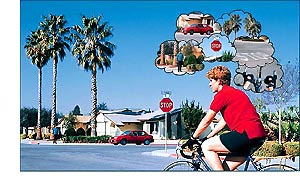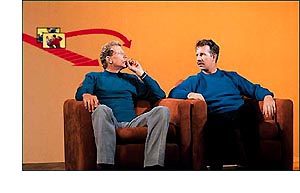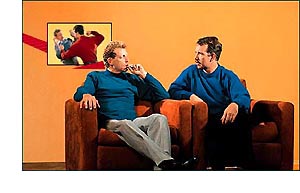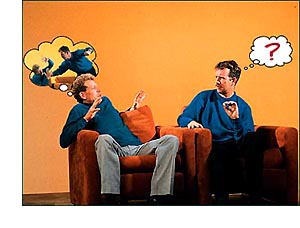Drugs essentially are poisons. The degree they are taken determines the effect. A small amount gives a stimulant (increases activity). A greater amount acts as a sedative (suppresses activity). A larger amount acts as a poison and can kill one.
This is true of any drug. Each requires a different amount.
Caffeine is a drug, so coffee is an example. One hundred cups of coffee would probably kill a person. Ten cups would probably put him to sleep. Two or three cups stimulates. This is a very common drug. It is not very harmful as it takes so much of it to have an effect. So it is known as a stimulant.
Arsenic is known as a poison. Yet a tiny amount of arsenic is a stimulant, a good-sized dose puts one to sleep and a few grains kills one.
But there are many drugs which have another liability: they directly affect the mind.
In order to have a good understanding of the mental effects of drugs, it is necessary to know something about what the mind is. The mind is not a brain. It is the accumulated recordings of thoughts, conclusions, decisions, observations and perceptions of a person throughout his entire existence. In Scientology it has been discovered that the mind is a communication and control system between a thetan and his environment. By thetan is meant the person himself, the spiritual being – not his body or his name, the physical universe, his mind, or anything else.
The most obvious portion of the mind is recognizable by anyone not in serious condition. This is the mental image picture.
Various phenomena connect themselves with this entity called the mind. Some people closing their eyes see only blackness, some people see pictures.

The mind is a communication and control system between a thetan and his environment. The mind is not a brain.
The thetan receives, by the communication system called the mind, various impressions, including direct views of the physical universe. In addition to this he receives impressions from past activities and, most important, he himself conceives things about the past and future which are independent of immediately present stimuli.
A person who has taken drugs, in addition to the physical factors involved, retains mental image pictures of those drugs and their effects. Mental image pictures are three-dimensional color pictures with sound and smell and all other perceptions, plus the conclusions or speculations of the individual. They are mental copies of one’s perceptions sometime in the past, although in cases of unconsciousness or lessened consciousness they exist below the individual’s awareness. For example, a person who had taken LSD would retain “pictures” of that experience in his mind, complete with recordings of the sights, physical sensations, smells, sounds, etc., that occurred while he was under the influence of LSD.
Let us say an individual took LSD one day while at a fairground with some friends, and the day’s experiences included feeling nauseated and dizzy, getting into an argument with a friend, feeling an emotion of sadness, and later feeling very tired. He would have mental image pictures of that entire incident.
At a later time, if this person’s environment were to contain enough similarities to the elements in that past incident, he may experience a reactivation of that incident. As a result he could feel nauseated, dizzy, sad and very tired – all for no apparent reason. This is known as restimulation: the reactivation of a past memory due to similar circumstances in the present approximating circumstances of the past.
Such mental image pictures can also be reactivated by drug residuals, as the presence of these drugs in the tissues of the body can simulate the earlier drug experiences.
Using the above example of the person who took LSD, sometime later – perhaps years afterward – the residuals of the drug that are still in his body tissues can cause a restimulation of that LSD incident. The mental image pictures are reactivated, and he experiences the same sensations of nausea, dizziness and tiredness, and he feels sad. He does not know why. He might also perceive mental images of the persons he was with and the accompanying sights and sounds and smells.
These are the effects on the mind of past drug usage. However, the current use of drugs creates a similar and more immediate effect on the mind.
When a person uses a drug such as marijuana, peyote, opium, morphine or heroin, mental image pictures of past times can “turn on” or restimulate below the individual’s conscious awareness, causing him to perceive something different than what is actually going on.
Thus, right there before your eyes, apparently in the same room as you are, doing the same things, the drug-taker is really only partially there and partially in some past events.
He seems to be there. Really he isn’t “tracking” fully with present time.
What is going on to a rational observation is not what is going on to him.
Thus, he does not understand statements made by another but tries to fit them into his composite reality, meaning a reality made up of different components. In order to fit them in, he has to alter them.

Drugs affect the mind by reactivating incidents from a person’s past, below his conscious awareness.

This can distort the drug user’s perception of what is happening around him.

As a result, the person’s actions may appear very odd or irrational.
For example, a drug user may be sure he is helping one repair a floor that needs fixing, but in fact he is hindering the actual operation in progress which consists of cleaning the floor. So when he “helps one” mop the floor, he introduces chaos into the activity. Since he is repairing the floor, a request to “give me the mop” has to be reinterpreted as “hand me the hammer.” But the mop handle is longer than a hammer handle so the bucket gets upset.
This can be slight, wherein the person is seen to make occasional mistakes. It can be as serious as total insanity where the events apparent to him are completely different than those apparent to anyone else. And it can be all grades in between.
It is not that he doesn’t know what is going on. It is that he perceives something else going on instead of the present sequence of events.
Thus, others appear to him to be stupid or unreasonable or insane. As they don’t agree in their actions and orders with what he plainly sees is in progress, “they” aren’t sensible. Example: A group is moving furniture. To all but one they are simply moving furniture. This one perceives himself to be “moving geometric shapes into a cloud.” Thus, this one “makes mistakes.” As the group doesn’t see inside him and only sees another like themselves, they can’t figure out why he “balls things up so.”
Such persons as drug-takers and the insane are thus slightly or wholly on an apparently different time track of “present time” events.
A drug may be taken to drive a person out of an unbearable present time or out of consciousness altogether.
In some persons they do not afterwards return wholly to present time.
A thetan can also escape an unbearable present time by dropping into the past, even without drugs.
The drug-taker and the insane alike have not recovered present time, to a greater or lesser degree. Thus they think they are running on a different time track than they are.
These are the underlying facts in odd human behavior.
As what is going on according to the perception and subjective reality of such a person is varied in greater or lesser degree from the objective reality of others, such a person disturbs the environment and disrupts the smooth running of any group – from family to business to nation.
We have all known such a person, so it is not uncommon in the current civilization. The sudden remark which makes no sense, totally out of context with what is being spoken about; the blank stare when given an order or remark – behind these lies a whole imaginary world which is jarred by our attempts to get something done in present time.
The repercussions of drugs then, go far beyond their immediate effects and often influence many others besides the user. The consequences can be very harmful. This is true not only of illegal street drugs but also of medical drugs that are supposed to help people.